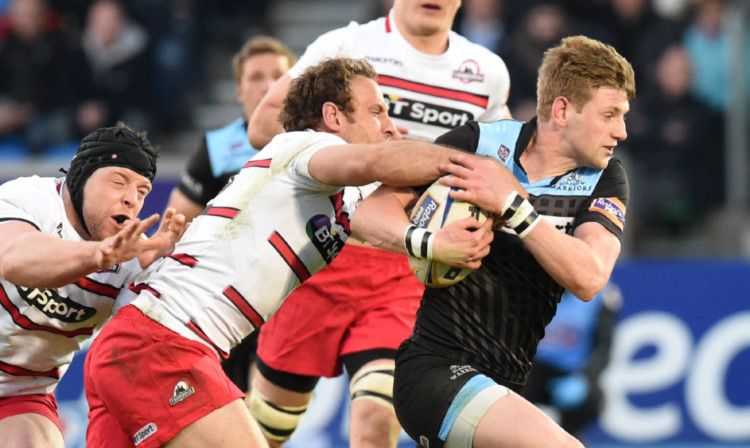Various ponderings after the second 1872 Cup clash at Scotstoun on Saturday
*Who has been the only player to start all of Glasgow’s run of six wins in succession to take them to the brink of a PRO12 play-off semi-final?
The answer is surprising, but only if you’ve not seen him play. It’s Finn Russell, and he’d not be far off from bring the MVP of this decisive run either, although personally I think he’s been edged by someone referred to below.
The 21-year-old has certainly been the find of the season for Gregor Townsend, to the extent that’s he’s already being touted as THE SOLUTION; that is, solving Scotland’s perennial problem at 10.
I’ve seen too many called THE SOLUTION before turn out to be nothing of the sort to be over-confident, but Russell is a direct runner, strong ball-handler, an excellent defender and kicks well from hand and from the tee. In all, potentially as good an all-rounder for 10 as we’ve had in some time.
He clearly needs to be tested further at 10 as well as 12 before a definitive judgement is made. But if the question is; has he merited a place on the Grand World Tour Scotland are undertaking this summer? The answer must be, unequivocally, yes.
*Russell and prop Gordon Reid, who has started five of the Warriors’ six-match run, are a glaring example of the difference in philosophies between the respective club managements at Scotstoun and Murrayfield.
The All-Scottish team at the Warriors have repeatedly trusted two native players who wouldn’t have been on anyone’s definite-starter list at the outset of the season. They’ve prospered and enhanced the team.
At Edinburgh, meanwhile, even if you accept the need to bolster the inexperienced native element with hardened, experienced players, the spate of short-term contracts on foreign journeymen hasn’t enhanced the team one bit.
Does Alan Solomons truly believe that Ross Rennie or Stuart McInally, discarded by him, would not have been as effective as Mike Coman or Tomas Leonardi? Has Andries Strauss really been an upgrade on Nick De Luca?
Wasn’t there a Scottish player Scott Wight on loan from Glasgow, maybe – who could have done as good a job as Carl Bezuidenhout?
In speaking up for Edinburgh’s policy recently, SRU chief executive Mark Dodson painted a picture of a series of players so traumatised by successive defeats under Michael Bradley that they had to be “moved on” to clubs in the English Championship. That seems a pretty profligate attitude to take to what is already a thin professional player base.
Scottish pro-teams have not been exactly flushed with success over the years, but when they have been consistently competitive (and fun to watch) it’s been when Scots have been in charge Richie Dixon, Sean Lineen and now Gregor Townsend at Glasgow, and Frank Hadden and Rob Moffat at Edinburgh.
The exceptions were Andy Robinson’s season at Edinburgh when money was tight and he had to make do with what he had – and Michael Bradley’s freak European run with the capital side two years ago.
The common thread, surely? Scottish coaches know the local talent and are willing to play them.
*Last season, Glasgow swept towards the play-offs as an apparently irresistible force. Only pitched among the succession of bonus point victories through March and April was an awful performance, a heavy loss away to Scarlets.
It came almost without warning. The Warriors were flying, racking up try bonuses, bound for a home play-off. The abject capitulation at Parc Y Scarlets meant they had to go away to Leinster in the semis, where they played well and may actually have deserved to win, but lost nonetheless.
The game at Treviso this week has all the potential to be a game just like that.
Lose, and surely Munster will do enough in their final two games to get home advantage. Treviso have shown enough life at home in recent games winning their last two and being edged by Ulster by two points in another to show they are a threat, and they need the points to secure the Italian qualifying place for the new European Rugby Champions’ Cup.
They also showed enough at Scotstoun three weeks ago to trouble the Warriors’ defence. The defensive shortcomings against Edinburgh, hopefully, were a warning shot.
Get a win there and Glasgow would need a bonus point win against bottom club Zebre to be certain of that home semi. I think they’d take that as a target.
*As we praise Glasgow, it’s important not to miss bad decisions they’ve made. One is surely not to offer an extension to Chris Cusiter, who has been the lynchpin and clearly the MVP of the team’s play-off run.
Budgets have to be managed and priorities balanced. It was clearly a difficult decision for Townsend to have to let go of Ruaridh Jackson, a player he’s invested a great deal of time in for both Scotland and Glasgow, although leaving for Wasps is probably the best thing for the player long-term.
But with Al Kellock winding down, Cus who I understand wanted to stay – is the sort of outstanding team leader who should be spending his last two or three years at Scotstoun, not at Sale.
